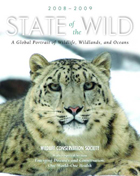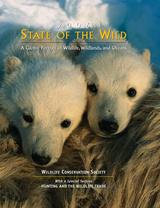
Each volume in the series combines evocative writings with a fascinating tour of conservation news highlights and vital statistics from around the world. One-third of each volume focuses on a topic of particular concern to conservationists working to protect wildlife and our last wild places. This 2008–2009 edition considers the integration of wildlife health, ecosystem health, human health, and the health of domestic animals—a “One World–One Health” approach to disease and conservation.
This focus is complemented with essays clustered into sections that address other key issues—conservation of species; conservation of wild places; people, culture, and conservation; and the art and practice of conservation. Essays cover a broad range of topics, from restoring biodiversity on the prairies to mapping the state of the oceans to the conservation impacts of lawlessness and coca cultivation in Colombia. Essay contributions come from people directly involved in on-the-ground conservation efforts and offer a unique and valuable perspective on often-overlooked topics.
State of the Wild’s accessible approach educates a wide range of audiences while at the same time presenting leading-edge scientific overviews of hot topics in conservation. Uniquely structured with magazine-like features up front, conservation news in the middle, and essays from eminent authors and experienced scientists throughout, this landmark series is an essential addition to any environmental bookshelf.

In wild places where nature thrives, humanity prospers; our well-being is inextricably linked with that of the planet's web of life. In fact, one could argue that the state of the world can be measured by the state of the wild.
But how do we gauge the state of earth's wildlife, wildlands, and oceans? State of the Wild is a new series that brings together some of the world's most renowned conservationists and writers-George Schaller, Alan Rabinowitz, Sylvia Earle, Rick Bass, Bill McKibben, Tom Lovejoy, and many others-to assess wildlife and wilderness, and to provide insights into how humans can become better stewards of the wild.
This new series combines evocative writings with a fascinating tour of news highlights and vital statistics from around the world. One-third of each volume will focus on a topic of particular concern to conservationists working to protect wildlife and our last wild places. This 2006 edition explores the impacts of hunting and the wildlife trade through a range of essays: Ted Kerasote traces the history of hunting in North America; Carl Safina, Eric Gilman, and Wallace J. Nichols quantify the toll taken by commercial fishing on seabirds, turtles, and other marine species; James Compton and Samuel K. H. Lee explore the global reach of the wildlife trade for traditional Asian medicine.
Contributors also examine other pivotal conservation issues, from the reasons why one in eight of the world's birds are endangered, to the impacts of global climate change, to the complexity of conserving seals, flamingos, zebras, and other wide-ranging species. The book's closing essay, "The Relative Wild," considers what exactly it means for a place to be "wild," where even the most remote corners of the planet have been altered by human activities.
Uniquely structured with magazine-like features up front, conservation news in the middle, and essay contributions from eminent authors and biologists throughout, this landmark series is an essential addition to any environmental bookshelf.
READERS
Browse our collection.
PUBLISHERS
See BiblioVault's publisher services.
STUDENT SERVICES
Files for college accessibility offices.
UChicago Accessibility Resources
home | accessibility | search | about | contact us
BiblioVault ® 2001 - 2024
The University of Chicago Press









